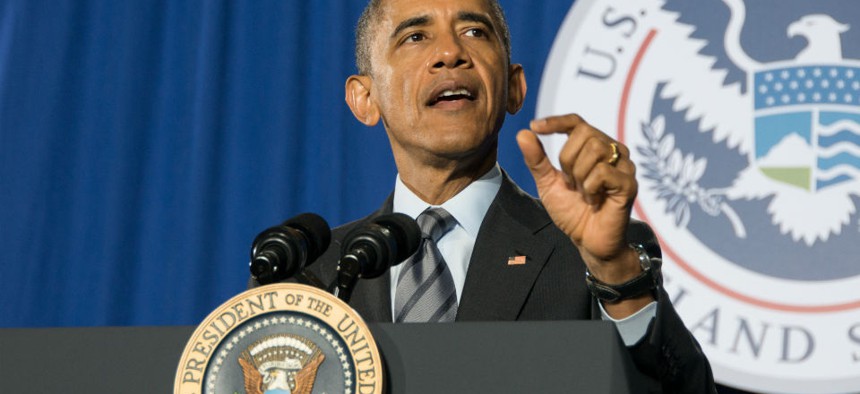
President Obama speaks at DHS headquarters on the day he released his fiscal 2016 budget. The president has warned of the damage a partial shutdown would do to security. Jetta Disco/DHS
The Homeland Security Department Is Starting Shutdown Prep
More than 85 percent of the department’s employees would have to report to work without pay, based on 2013 plans.
With just one week until the agency would be forced to shut down, the Homeland Security Department has begun preparing for an appropriations lapse.
The department is taking “prudent steps” to update its 2013 shutdown guidance, a DHS official told Government Executive. If Congress fails to reach a funding agreement by Feb. 27, the agency would officially shut down.
Practically speaking, because so many DHS functions are fee funded or entail “performing emergency work involving the safety of human life or the protection of property,” most of the department’s employees would still report to work even if Congress fails to pass an 11th hour funding measure next week. DHS does not have to reach back far to map out exactly what that situation would look like, including who would be furloughed and who would have to work temporarily without pay, as the entire government shutdown for two weeks in 2013.
President Obama and DHS Secretary Jeh Johnson have gone to great pains to convince lawmakers that, despite most employees continuing to work, a shutdown would drastically damage the department and national security. Both have emphasized the effect it would have on the workforce, both for the employees forced to take unpaid furloughs and those would have to work without receiving paychecks. Republicans, infuriated by Obama’s executive action to defer deportations for certain undocumented immigrants, have so far refused to budge from their plan to derail the immigration order through the DHS funding process.
Senate Democrats have blocked GOP policy riders from going through Congress, and Obama has threatened to veto them anyway, leaving the next steps unclear. For their part, Obama and congressional Democrats have called for a “clean” spending measure, free of any new immigration policy measures.
DHS received a glimmer of hope for avoiding a shutdown this week when a federal judge in Texas temporarily halted Obama’s deportation deferral program from commencing, perhaps providing an avenue for Republicans to pass a clean measure while allowing the courts to rule on the White House’s actions. But with Congress on recess until Tuesday, it remains unclear if Republicans would be satisfied with that plan; just days before the court ruling House Speaker John Boehner, R-Ohio, said he would “certainly” allow DHS to shut down.
Some Republicans are beginning to show a willingness to give in, however. Sen. John McCain, R-Ariz., said on MSNBC Thursday the court decision was “the perfect reason not to shut [DHS] down.”
Others on Capitol Hill have floated the possibility of providing DHS with short-term relief in the form of a continuing resolution, rather than a full-year appropriation as all other federal agencies have already received. Johnson derided that plan on Fox News this week, saying it would hinder long-term planning.
“When you're on a continuing resolution, it is a little like trying to drive cross-country with no more than five gallons of gas at a time and you don't know when the next gas station is,” Johnson said. “You can't plan. You can't plan except days and weeks at a time.”
Johnson’s own office -- the Office of the Secretary and Executive Management -- would be one of the hardest hit if DHS funding runs out, based on 2013 data. Just 10 percent of his immediate staff would report during a shutdown. The Science and Technology, Defense Nuclear Detection, Federal Law Enforcement Training Center and Undersecretary for Management offices would be almost entirely shuttered. U.S. Citizenship and Immigration Services, the Transportation Security Administration, the U.S. Secret Service, Customs and Border Protection and the U.S. Coast Guard would all have a higher percentage of employees reporting to work than the DHS-wide figure of 86.4 percent.







